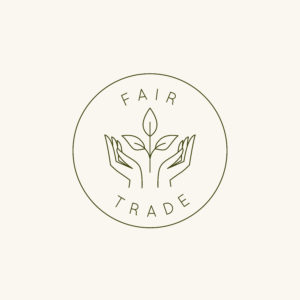Hi, I’m Katia.
I’m 27 years old and, if you’ve been here before, you know that I am a new mom living in a new city (NYC). More importantly, you might also know that I’m really into sustainability. If you didn’t know, well, now you do. I will be sharing with you some ways to be a more conscious consumer. But why should I care about that when the corporations who have the power to make a difference don’t care? I’m glad you asked. Contrary to popular belief, our individual actions can and do make a difference. This is why learning about ethical consumerism is important: it helps us understand the power that we, as individual consumers, have in the world. I, for one, cannot have a clear conscience if I allow other people’s actions (or lack thereof) to dictate my own; if I don’t take it upon myself to do what I can and change what does not align with my values. Just because other people are complacent with the status quo, doesn’t mean you have to be. Being mindful of others and the world around us is a daily practice but it is also a lifelong practice that will eventually become a habit. So instead of asking the question above, ask the following: if you have the power to affect positive change, even if at a small scale, why wouldn’t you?
Ethical Consumerism – What is it and Why is it Important?

In world fueled by the constant growth of consumer markets, it’s easy to forget that the services and products we buy and use on a daily basis can have significant environmental and social impacts. Your smartphone uses highly-polluting lithium, your clothes resource-intensive cotton or microplastic-shedding polyester, your food may be harvested by modern day slaves or packaged in unsafe working environments—the list goes on.
However, change is in the air, and what is increasingly clear is that consumers are demanding a better system, one that places more value on both the planet and the people who make the products we use. This movement in known as ethical consumerism, and as more people take up the cause, it is hoped that both attitudes and practices can be changed to focus less on profit, and more on social and environmental sustainability.
Here, we explore the concept of ethical consumerism and why it’s important to play your own part.
What Does it Mean to Be an Ethical Consumer?
 Ethical consumerism is essentially an exercise in actively searching out and purchasing products that are ethically sourced, ethically made, and ethically distributed. It follows the concept of dollar voting, a type of consumer activism that aims to influence companies and push them to make products or provide services that are more ethically and environmentally sound. Essentially, you vote with your dollar, either spending or withholding it to reclaim power over the consumerist status quo.
Ethical consumerism is essentially an exercise in actively searching out and purchasing products that are ethically sourced, ethically made, and ethically distributed. It follows the concept of dollar voting, a type of consumer activism that aims to influence companies and push them to make products or provide services that are more ethically and environmentally sound. Essentially, you vote with your dollar, either spending or withholding it to reclaim power over the consumerist status quo.
When we change our consumer habits to address ethical concerns, companies take notice and may change the way certain product are sourced and manufactured. Put simply, if enough of us start (or stop) demanding certain products, companies will start (or stop) supplying them.
This means that that slowly, over time, companies will be pushed to supply a new demand for non-destructive goods and services that consumers want to buy.
 Why is it Important to be an Ethical Consumer?
Why is it Important to be an Ethical Consumer?
As we’ve already touched upon, the importance of ethical consumerism lies in its potential to influence companies by forcing them to face their environmental impacts. Its approach is less about being told “what we want” by glitzy advertising campaigns and celebrity endorsements, and more about demanding “what we need” with sustainability and ethical practices in mind.
Potentially, it has to the power influence and affect a broad range of factors that have implications for the global population and the planet. This means;
- Promoting fair trade, organic, and cruelty free products that not only reduce harm but build more sustainable systems for people, animals, and soils and water.
- Promoting the use of recycled or repurposed materials that reduce our reliance on virgin resources that are often destructively mined or manufactured.
- Raising equality through fair pay and better working conditions in poorer countries, while also promoting local businesses and organizations
- Boycotting well-known unethical products or brands, for a huge range of reasons from unpaid corporate taxes to animal testing or child labor practices.
- Encouraging divestment from fossil fuel, mining, and other highly polluting industries.
How Can I Be a Conscious Consumer?
Today, being a conscious, ethical consumer is not necessarily an easy task. Companies aren’t always transparent or honest about their supply chain habits, the way they treat their staff and agency workers, or their environmental impact. It can also be very difficult to decipher the huge range of ecological and fair trade claims made on packaging or in advertising, means that Greenwashing is also an issue.
Despite this, however, there are still many steps we can take to ensure that we shop ethically.
 1. Think before you buy
1. Think before you buy
This is the first step because it lays out the foundation about whether or not the item in question is ultimately a good buy. As yourself; “Do I need this? How often will I use or wear this? What impact did the item in question have on children, communities and the environment?”
Being mindful of others and the world around us is a daily practice but it is also a lifelong practice that can quite quickly become a healthy habit. With these fundamental decision-making questions, you can begin to successfully navigate ethical consumerism.
2. Check for and choose certified products and conduct your own research
There are a few indications you can rely on when it comes to whether a product is ethical. One is the seal they carry — Fairtrade, Rainforest Alliance and UTZ, among many other seals and certifications, are indications that work has been done (and is continually being done) to ensure ethical practices.
Even if none of these seals are available on product packaging, it is still possible and important to read ingredients and research the products and companies we buy from to find out whether they’re socially responsible. Ethical Consumer is one of a small number of organisations that rank brands and products on a range of ethical issues.
Additionally, you may find companies do, in fact, promote their own metrics relating to environmental reporting, climate change, pollution, and usage of toxic chemicals.
3. Shop local
Shopping local, when possible, reduces the miles it takes to get your food or other goods to you. By cutting down on these miles, you reduce your environmental impact. Furthermore, when it comes to buying local produce, it typically means you can buy fresher, organic food that is itself better for the environment than heavily processed or non-organic foods.
The ethical consumerist movement is still relatively new, however, as it gathers pace, it is already beginning to make a difference. Brands and companies are being forced to be more transparent about their practices, and with increased demand for ethical products also highlighting new environmental and social issues to explore, consumers everywhere are beginning to realise that the power, in part, is in their hands.
For more information on zero-waste practices, subscribe to zerowaste.com. Alternatively, speak with one of our TRUE Advisors for insights into going zero waste and see if TRUE Certification is right for you.



